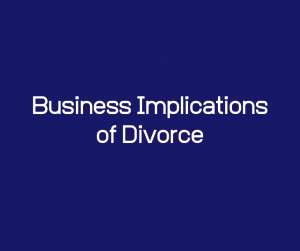What to Expect in Your Initial Meeting with a Family Law Attorney
Making the decision to contact a family law attorney to address your legal issues is understandably stressful, and can add anxiety to the already painful concerns that have prompted your need for representation and legal advice. Whether your matter is related to divorce, child custody, child support, spousal support, alimony pendente lite, alimony, or equitable distribution matters, knowing in advance what to expect can help you be prepared and raise your comfort level. The information provided here will hopefully take some of the mystery and worry out of taking that first step: the consultation.
Business Implications of Divorce
When a business owner gets divorced, the business is often the major asset subject to distribution. Accordingly, the business and its’ ongoing operations are almost always implicated in the divorce. In most cases that I see, the business is a small business with one owner or a few owners. In the best case scenario, the business owners have planned in advance for situations that arise in a divorce through a Shareholders Agreement, Prenuptial Agreements and/or Postnuptial Agreements. Hopefully, the parties’ respective family law and business law attorneys can work together to best protect the business owner to ensure as smooth a transition as possible. Hopefully, the relevant agreements have set forth a valuation formula which can be upheld at law for purposes of the divorce. Counsel can also work together to insure that income is clearly defined and reported so that support is less contentious. Additionally, advance planning can be used to address the below issues so that a divorce does not mean the end to the business. While advance planning is not a guarantee, it will provide additional protections to the business owner.
A divorce can impact internal and external business relationships, support (between spouses and child support), equitable distribution (division of marital property) and business control. In terms of business relationships, banking relationships can come into play, especially if the spouse is a personal guarantee of the loan. It is often not easy or possible to have the spouse removed from the guarantee. The spouse may also have a role in the business and it may not be feasible for them to remain involved. For example, in cases where the spouse is client facing, a delicate balance will be necessary to transition the spouse out of the business without negatively impacting the business. This can be a challenge if the divorce is acrimonious. Finally, the roles of the parties within the business may create sustainability issues going forward. In some cases, one spouse has a particular talent (i.e. software development, marketing creativity or scientific knowledge) which cannot be easily replaced and without which the business may not be able to survive. Such issues impact valuation but also succession and strategy on distribution of assets.
As for support, when a business owner is a party to a support action, whether for support for a spouse or for a child, calculating income can be challenging. The definition of income for purposes of determining support is very broad and is not the same as taxable income. There can be practical issues in obtaining information and documents which reflect the income. Legal issues can also arise, such as whether income is being reported or if the court can compel income or retained earnings to be distributed from the business to the owner to pay support.
In equitable distribution, the business must be valued so that division of the assets can occur. Business control also comes into play. It is unusual for parties to retain joint ownership or for the non-business owner spouse to receive shares of the business so creativity and/or structured payments are often necessary unless there is enough cash reserved for an outright payment. The payout can cause a financial strain for the business.
To best protect a business in the event of a divorce of the business owner, it is advisable for business owners to have advance planning through the mechanisms listed above. While not a guarantee, it will place the business owner spouse in a much better position than ignoring these issues all together.
Tax Planning Already for Next Year? For those going through a separation or divorce, it might be the right time.
Most people believe that they have plenty of time before they have to start considering their 2016 taxes to be filed in 2017, and for most, the tax return process is not something they just can’t wait to get started. That being said, if you are separated or in the process of a divorce, now is the time to start thinking about your tax filing status for your 2016 income tax returns. Some thoughtful planning and discussion now can go a long way in avoiding stressful emergency issues in the weeks leading up to April 15th, and instead provide adequate time to address and resolve any concerns. If you are separated but not divorced by December 31, 2016, you have a few different options of how you can file your taxes: married filing jointly, married filing separately or perhaps even head of household. You cannot file single if you are not divorced in 2016.
The reason to start thinking about your 2016 tax filing status now is that if you want to file as married filing jointly, your spouse must agree. Now is the time to speak to your accountant to determine the most advantageous tax filing status. You should also decide if there are any concerns that you have that would prevent you from choosing one of the options. If you and your accountant determine that married filing jointly is the best option, and your spouse disagrees, you will have time to involve the attorneys and work towards an agreement as to tax filing status. In many cases, an Agreement to File Joint Income Tax Returns/Tax Indemnification Agreement is the best way to proceed in order to set forth each spouses’ responsibilities in terms of preparing and filing the returns, addressing any taxes due or refunds that might be received, and to protect you from any potential tax liability related to your spouse.
You can set yourself up for a less stressful tax season in 2017 by starting the discussion now.
Breaking News – New One Year Separation Requirement Under the Divorce Code
On October 4, 2016, Governor Wolf signed into law new legislation that will change the separation requirement from a two year waiting period to one year. The law goes into effect on December 3, 2016. Under current law, the Divorce Code provides that in cases where only one party desires a divorce, that party must wait two years from the date of separation before they can move the matter forward. At that two year mark, the party who is seeking the divorce can move the matter forward without the non-consenting party’s agreement. The longer waiting period has often led to cases dragging on for too much time, which can lead to more animosity between the parties. For children involved in the separation, this has often had a negative impact. As a result of the passage of this new law, the hope is that cases will resolve much more quickly.
It should be noted, however, that at the one year mark from the date of separation, the case is not resolved, but rather at that time the case is permitted to proceed. It is by no means a guarantee that the process will not be lengthy from that point forward.
Stay tuned for updates as we see how the law is applied by the courts.
What Can I Expect at the Initial Divorce Consultation?
The initial divorce consultation is your first meeting with the attorney. It occurs before you retain the attorney and can be utilized to determine if you and the attorney can work effectively together. Sometimes this meeting occurs because you want to have the knowledge and information if you foresee potential divorce, support or custody issues in the future or are considering a prenuptial agreement. Other times, there may be issues which require you to hire a family law attorney immediately.
Prior to the first meeting, our office will ask you to be aware of relevant topics and materials to ensure a productive meeiting. At the first meeting you are asked to bring information related to your income, assets and liabilities. If you do not have access to this information, the meeting can go forward without the information, as it can be acquired from the other party during the divorce process. Expect to be asked questions related to these areas as that will allow the attorney to provide you with a better overview of the anticipated range for a resolution of your case, whether by agreement or court order. The asssessment made at the initial consultation is based on the financial data provided, and may change as more specific information is made available. It's a good idea to make a list of your questions in advance of the initial consultation, so that the meeting will be more productive, and you do not forget to ask about your concerns.
The purpose of the first meeting with a domestic relations attorney is to gain information and have your questions answered. Over the course of an hour you will be provided with an overview of aspects of family law that may affect you: divorce, support (child support, spousal support, alimony pendente lite and alimony), custody and/or a prenuptial agreement. You may be provided with the anticipated range of outcomes for your case based upon the information provided at the consultation. Most importantly, you will have an opportunity to have your questions answered. Having a general understanding of the process and answers to your questions is important at a stressful time like this.
While this is a difficult meeting for many clients, it is important to remember that the attorney is the one who is providing information and answering questions. Family Law practitioners are well aware that clients are going through a very emotional process, and it the attorney's responsibility to put the client at ease, and help to navigate this unfamiliar and emotionally fraught territory as painlessly as possible.

























